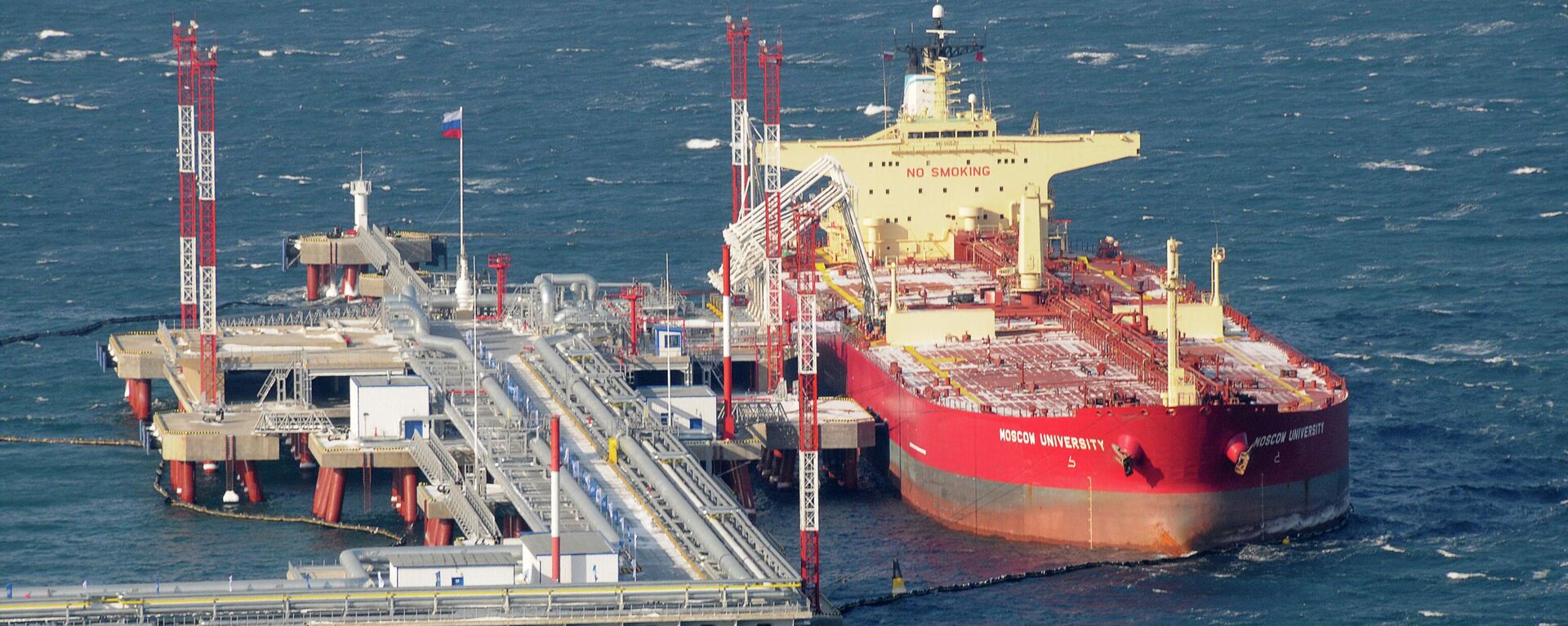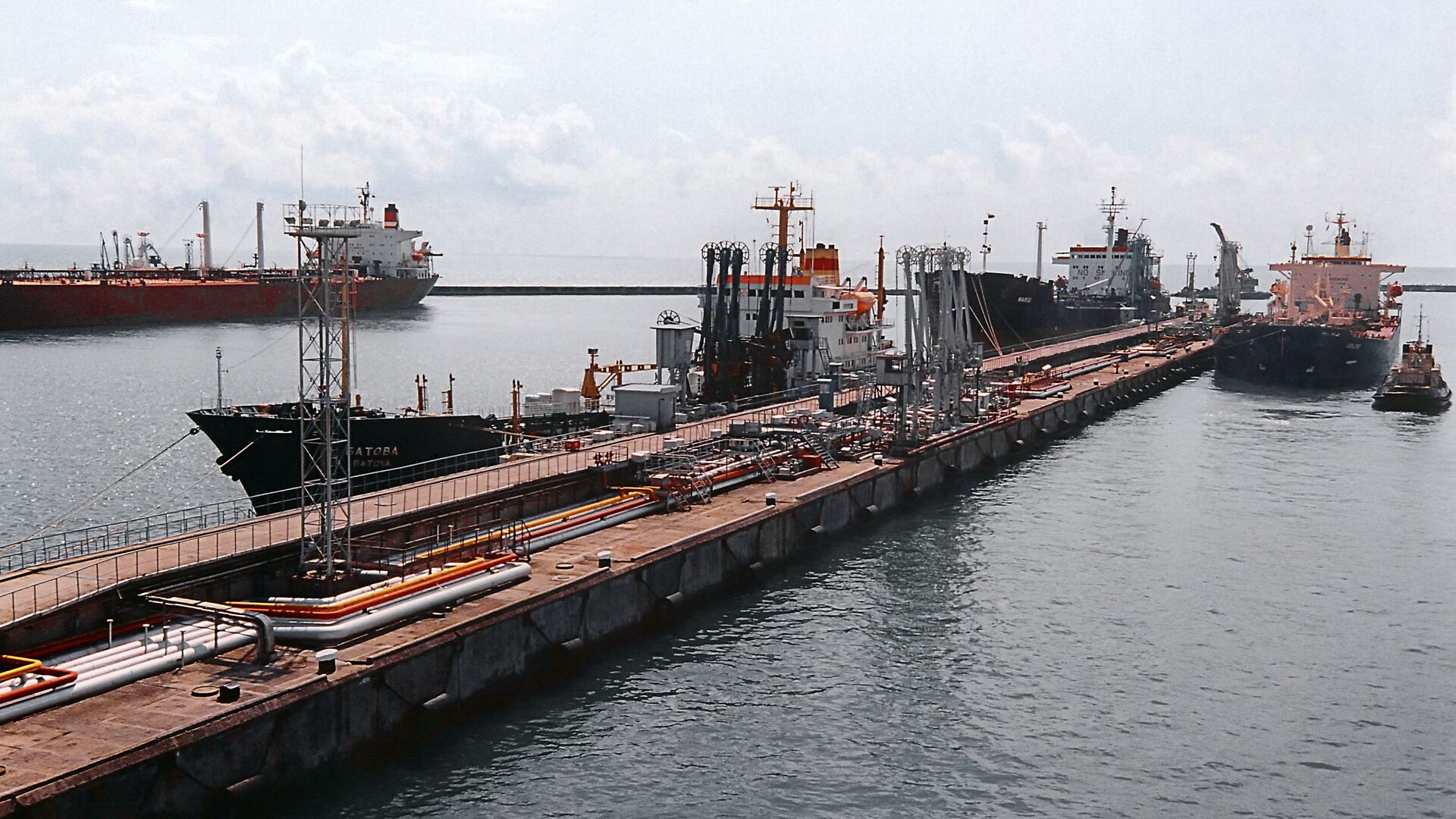https://sputnikglobe.com/20221208/oil-price-cap-europeans-set-to-feel-more-pain-at-the-pump-soon-experts-say-1105238181.html
Oil Price Cap: Europeans Set to Feel More Pain at the Pump Soon, Experts Say
Oil Price Cap: Europeans Set to Feel More Pain at the Pump Soon, Experts Say
Sputnik International
The Group of Seven, Australia and the EU launched the price cap scheme targeting Russian maritime crude on December 5. Simultaneously, Brussels banned all... 08.12.2022, Sputnik International
2022-12-08T17:34+0000
2022-12-08T17:34+0000
2022-12-08T17:34+0000
analysis
us
europe
russia
g7
oil
petroleum
gasoline
sanctions
https://cdn1.img.sputnikglobe.com/img/07e5/05/19/1082989618_0:165:3050:1881_1920x0_80_0_0_9a757c6a209c391924345dc3c26521d5.jpg
"In the short run, I don't think there's actually going to be that much impact on consumers," Marc Ostwald, chief economist at ADM Investor Services International, told Sputnik. "In the longer run, I think the greater risk with this is that we have a base effect coming in next year, which should in terms of energy prices, which are the biggest impact above all in Europe on inflation, (...) probably mean that perhaps inflation doesn't come down as quickly as both central banks and consumers hope."Even before the implementation of the new ban and the $60 price cap, Europeans saw a spike in gasoline prices which jumped from €1.19 per liter (2021) to €1.39 (2022) in Poland; from €1.47 to €1.7 in Germany; and from €1.57 to €2.01 in Greece. Needless to say, growing fuel prices are whipping already skyrocketing inflation in the Eurozone.Ordinary Europeans may expect greater pain at the pump in the future: a gasoline shortage has already swept Hungary with Hungarian Prime Minister Viktor Orban scrapping fuel price limits on Wednesday. The country is seeing a surge in demand and a drop in supply of fuel with Budapest blaming EU sanctions on Russia for the crunch. Brussels' "double-punch" on Russia's crude is about to backfire as international analysts predict a spike in oil prices in the foreseeable future.A combination of factors could bring unpleasant surprises next year: China's COVID recovery is likely to bolster fuel demand; OPEC+ does not seem willing to step up production; western sanctions may to some extent disrupt Russia's daily crude flow; and finally Russia may slash its output if third countries join the G7's price capping initiative.The Bank of America (BofA) projects Brent crude to reach $110 per barrel in 2023, specifying that unexpected risks could add $20-$25 per barrel to the already soaring price tag.To complicate matters further, an EU ban on imports of Russian oil products, including gasoline, diesel and jet fuel, will come into force in February 2023. The development is likely to rub salt into Europe's already aching wound. Even though Europe's reliance on Russia's oil products decreased by a whopping 50% since the beginning of Moscow's special operation in Ukraine, Russia still remains the bloc's largest diesel supplier.In November, Reuters broke that the European bloc is scrambling to secure Russian diesel three months before an import ban is launched. Russian diesel deliveries to the Old Continent's Amsterdam-Rotterdam-Antwerp (ARA) oil refining hub soared to 215,000 barrels per day from November 1 to 12. That amounted to a 126% spike from October. Previously, Europe increased its imports of the Russian commodity by more than a fifth in July.It is unclear who will fill Russia's shoes after the new ban is introduced. Diesel is used in all branches of Europe's industry and agriculture. Thus, for European farmers, diesel is nothing short of their lifeblood. During the harvesting season in October, French farmers raised the alarm over the crippling shortage of the fuel as they needed diesel for their combine harvesters.Those who will implement the G7 measure are likely to find themselves in the same boat as Europeans: Moscow made it crystal clear that it won't sell its hydrocarbons to those who are playing the price-capping game.
https://sputnikglobe.com/20221206/how-g7-price-cap-started-disrupting-global-oil-flows-while-failing-to-slash-russias-earnings-1105113734.html
russia
Sputnik International
feedback@sputniknews.com
+74956456601
MIA „Rosiya Segodnya“
2022
News
en_EN
Sputnik International
feedback@sputniknews.com
+74956456601
MIA „Rosiya Segodnya“
Sputnik International
feedback@sputniknews.com
+74956456601
MIA „Rosiya Segodnya“
group of seven, price cap on russia's oil, soaring gasoline prices, pain at the pump, anti-russia sanctions, diesel
group of seven, price cap on russia's oil, soaring gasoline prices, pain at the pump, anti-russia sanctions, diesel
Oil Price Cap: Europeans Set to Feel More Pain at the Pump Soon, Experts Say
The Group of Seven, Australia and the EU launched the price cap scheme targeting Russian maritime crude on December 5. Simultaneously, Brussels banned all seaborne deliveries of Russian oil to the Old Continent. Has this made life easier for ordinary Europeans?
"In the short run, I don't think there's actually going to be that much impact on consumers," Marc Ostwald, chief economist at ADM Investor Services International, told Sputnik.
"In the longer run, I think the greater risk with this is that we have a base effect coming in next year, which should in terms of energy prices, which are the biggest impact above all in Europe on inflation, (...) probably mean that perhaps inflation doesn't come down as quickly as both central banks and consumers hope."
Even before the implementation of the new ban and the $60 price cap, Europeans saw a spike in gasoline prices which jumped from €1.19 per liter (2021) to €1.39 (2022) in Poland; from €1.47 to €1.7 in Germany; and from €1.57 to €2.01 in Greece. Needless to say, growing fuel prices are whipping already skyrocketing inflation in the Eurozone.
Ordinary Europeans
may expect greater pain at the pump in the future: a gasoline shortage has already swept Hungary with Hungarian Prime Minister Viktor Orban scrapping fuel price limits on Wednesday. The country is seeing a surge in demand and a drop in supply of fuel with Budapest blaming EU sanctions on Russia for the crunch. Brussels' "double-punch" on Russia's crude is about to backfire as international analysts predict a spike in oil prices in the foreseeable future.
"The unintended consequences or unexpected consequences would be a rise, but it's a more complex story because the oil market at the moment is also a story not just about the oil embargo, which has been imposed, but also about people's expectations for the global economy," Ostwald warned. "And on that basis, the oil market is coming under a lot of pressure. And that's actually definitely overriding any impact from the oil embargo."

6 December 2022, 18:14 GMT
A
combination of factors could bring unpleasant surprises next year: China's COVID recovery is likely to bolster fuel demand; OPEC+ does not seem willing to step up production; western sanctions may to some extent disrupt Russia's daily crude flow; and finally Russia may slash its output if third countries join the G7's price capping initiative.
The Bank of America (BofA) projects Brent crude to reach $110 per barrel in 2023, specifying that unexpected risks could add $20-$25 per barrel to the already soaring price tag.
Thierry Bros, professor at the Paris Institute of Political Studies and a contributor to Natural Gas World, told Sputnik: "This is unprecedented. The G7 and EU imposed an embargo on Russian oil to try not to finance the Russian military. But the world cannot do without Russia, which is the [third] largest world producer and the first largest exporter [in terms of all oil products]. We cannot afford to lose the 2.5 million barrels per day of Russian oil and oil products (50/50) that are exported to the EU."
To complicate matters further, an EU ban on imports of Russian oil products, including gasoline, diesel and jet fuel, will come into force in February 2023. The development is likely to rub salt into Europe's already aching wound. Even though Europe's reliance on Russia's oil products decreased by a whopping 50% since the beginning of Moscow's special operation in Ukraine, Russia still remains the bloc's largest diesel supplier.
In November, Reuters broke that the European bloc is scrambling to secure Russian diesel three months before an import ban is launched. Russian diesel deliveries to the Old Continent's Amsterdam-Rotterdam-Antwerp (ARA) oil refining hub soared to 215,000 barrels per day from November 1 to 12. That amounted to a 126% spike from October. Previously, Europe increased its imports of the Russian commodity by more than a fifth in July.
It is unclear who will fill Russia's shoes after the new ban is introduced. Diesel is used in all branches of Europe's industry and agriculture. Thus, for European farmers, diesel is nothing short of their lifeblood. During the harvesting season in October, French farmers raised the alarm over the crippling shortage of the fuel as they needed diesel for their combine harvesters.
"EU/G7 citizens should expect higher prices at the pumps," warned Bros. "Countries able to access rerouted Russian oil get lower oil inflation."
Those who will implement the G7 measure are likely to find themselves in the same boat as Europeans: Moscow made it crystal clear that it won't sell its hydrocarbons to those who are playing the price-capping game.





